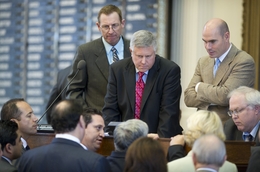We lucked out this week with a set of questions that seemed to anticipate a U.S. Supreme Court decision on campaign finance and transparency. Sometimes you’re smart, and sometimes you’re lucky.
A large majority said all contributions to all groups should be disclosed, and two-thirds of the insiders said the same people would contribute if disclosures were always required.
About two in five said political groups are less influential when their financial sources are disclosed, but 12 percent said disclosure makes them more effective and 36 percent said it’s a wash.
Does full financial disclosure to voters change election outcomes? Yes, according to 45 percent of the insiders, followed closely by the 40 percent who said no.
We’ve included a full set of verbatim comments on the questions in the attachment. A sampling:

.
Should people and interests donating to campaigns and to third-party political groups be required to identify themselves and the details of their contributions?
• "I don't know about 'the details' but identities and dollar amounts should be required. This, from a supporter of the back-room deal..."
• "Let's go back to the days of chicken magnates handing out thick envelopes around the Capitol - it's fair for everyone when there are no rules, right?"
• "I have never seen an argument that outweighs the right of voters to know who is supporting candidates who want to represent the citizens of Texas."
• "Contributors to political campaigns and third-party political groups should be required to identify themselves to the campaign or group to which they donate. The campaign or group should be required to disclose the contribution."
• "No. The only reason they were required to identify themselves in the first place was: 1) so incumbents could punish all those that went against their re-election efforts; and 2) so incumbents could charge the appropriate amount for the late-trainers."
• "It is ridiculous to report all the details on a $50 donation and be able to hide a $100,000 one with a third-party group that is as political as any campaign."

.
If the actual sources of campaign financing were revealed in a full and timely way, would the same people and interests take part in Texas elections?
• "Probably not to the same extent they do under the cloak of darkness. It all feels so rigged, bought and paid for now. Not very encouraging for efforts to increase voter turnout."
• "This is a 'yes, but ... ' question. Yes, but in a much different manner."
• "Some of the hot money would not be given if it were to be disclosed"
• "Let’s try it and see"
• "Maybe. Some would, others would be more hesitant. The bigger issue would be that people might figure out how few people are actually financing the campaigns and why they have such significant influence."
• "Some people are obviously interested in anonymity, or else it would not be offered."

.
Are third-party political groups more or less influential in elections when they are required to reveal their financial sources?
• "That depends on who the third party group is, what the scheme behind the dark giving is and how much the voters care about the scheme."
• "This question assumes all 3rd party groups are created equal, but they aren't. Revealing sources probably makes no real difference to a legitimate group. But a sham group acting as a front for a single contributor would be much less influential after being forced to reveal its sole source."
• "Paid media -- particularly slate mailers -- are probably the most influential factor in Texas elections -- and much of that has disclaimers on it."
• "When the public is made aware of the source of funding, it tempers influence of that funding."
• "Less effective when Lunch Pail Guy finds out that 'Taxpayers for the Working Man' is really a rich guy or two that just flat out don't want to pay any taxes to do things like support the public schools Lunch Pail Guy's kids attend"
• "No difference in the campaign, but the real problem happens during the session. Disclosure is a lobbying problem, not a campaign one."

.
Would election outcomes in Texas be any different if voters were aware of the actual sources of all of the money spent by and on behalf of the various campaigns, bond issues and other initiatives?
• "Another 'Yes, but...' Insiders kid themselves. Voters don't care. For the 5% of the population that actually gives a crap, it would depend on the group who's spending, their relevance to the issue, and the amount and source of money...”
• "A vast number of Americans can't even name a sitting US Senator, much less cite the sources of how campaigns are financed."
• "People who want to know can almost always find out who is funding something."
• "It’s an interesting question to ponder. I would like to believe that once Texans 'figure it out,' they will realize the need to participate to get everything back on track."
• "Would hope so, but our abysmal turnout makes me wonder. Don't think you will convince any of the crazies that their anointed are tainted."
• "Unless there's actual bribery, the public doesn't care."
Our thanks to this week’s participants: Gene Acuna, Jenny Aghamalian, Victor Alcorta, Brandon Alderete, Clyde Alexander, George Allen, Jay Arnold, Charles Bailey, Dave Beckwith, Andrew Biar, Allen Blakemore, Tom Blanton, Chris Britton, David Cabrales, Lydia Camarillo, Kerry Cammack, Thure Cannon, Snapper Carr, Janis Carter, Corbin Casteel, William Chapman, Elna Christopher, Kevin Cooper, Beth Cubriel, Randy Cubriel, Denise Davis, June Deadrick, Nora Del Bosque, Glenn Deshields, Holly DeShields, Tom Duffy, David Dunn, Richard Dyer, Jeff Eller, Jack Erskine, Jon Fisher, Norman Garza, Dominic Giarratani, Bruce Gibson, Stephanie Gibson, Daniel Gonzalez, John Greytok, Clint Hackney, Wayne Hamilton, Bill Hammond, John Heasley, Ken Hodges, Steve Holzheauser, Billy Howe, Laura Huffman, Deborah Ingersoll, Richie Jackson, Cal Jillson, Mark Jones, Robert Jones, Richard Khouri, Tom Kleinworth, Ramey Ko, Nick Lampson, Pete Laney, Dick Lavine, James LeBas, Luke Legate, Mark Lehman, Leslie Lemon, Ruben Longoria, Vilma Luna, Matt Mackowiak, Luke Marchant, Steve Minick, Bee Moorhead, Mike Moses, Steve Murdock, Keir Murray, Nelson Nease, Keats Norfleet, Pat Nugent, Todd Olsen, Nef Partida, Gardner Pate, Robert Peeler, Bill Pewitt, Tom Phillips, Wayne Pierce, Allen Place, Royce Poinsett, Gary Polland, Jay Pritchard, Jay Propes, Ted Melina Raab, Tim Reeves, Patrick Reinhart, David Reynolds, Grant Ruckel, Jason Sabo, Andy Sansom, Jim Sartwelle, Barbara Schlief, Stan Schlueter, Bruce Scott, Robert Scott, Steve Scurlock, Ben Sebree, Christopher Shields, Julie Shields, Nancy Sims, Jason Skaggs, Ed Small, Larry Soward, Leonard Spearman, Dennis Speight, Tom Spilman, Jason Stanford, Bill Stevens, Bob Strauser, Colin Strother, Sherry Sylvester, Gerard Torres, Trey Trainor, Vicki Truitt, Ken Whalen, David White, Darren Whitehurst, Christopher Williston, Seth Winick, Peck Young, Angelo Zottarelli.










